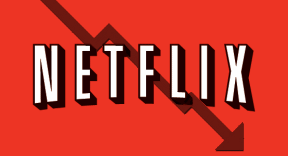Netflix third quarter earnings are out, and along with it the quarterly shareholder letter from CEO Reed Hastings and CFO David Wells. In the letter (embedded below), Netflix talks about the impact of recent pricing changes and its now-retracted strategy to divide the streaming and DVD services into two businesses. The price changes in particular “hurt our hard‐earned reputation, and stalled our domestic growth.”
Netflix expects the impact to lower both revenues and profits in the fourth quarter. And in the first quarter of next year, the company expects to lose money as it invests heavily to launch in the UK and Ireland. It expects to continue to be in the red “for a few quarters.” But it plans to return to profitability after the international launch (it will have to pause other international expansion plans to do so).
Netflix lost 800,000 subscribers last quarter, ending up with 23.8 million (21.5 million streaming subscribers and 13.4 million DVD rental subscribers). It made $62 million in profits (up 63 percent annually) on $822 million in revenues (up 49 percent). Next quarter, Netflix expects the international business to contribute a loss of between $60 million and $70 million due to the cost of launching in the UK and Ireland.
In the letter, Hastings also takes the opportunity to downplay the loss of the Starz partnership, which included access to Sony movies. Starz videos currently makes up about 6 percent of viewing hours on Netflix. With the SOny movies, which were pulled a few months ago, that number would rise to 10 percent. So 90 percent of the time, Netflix viewers were watching non-Starz titles. Still, that is a pretty significant amount of content from just one partner.
Below is an excerpt of the the beginning of the letter, followed by the entire embedded document.
The Internet is transforming video entertainment, stream by stream, consumer by consumer, nation by nation. Our opportunity is to be one of the leaders of this transformation with the best streaming video subscription service on the planet. The last few months, however, have been difficult for shareholders, employees, and most unfortunately, many members of Netflix. While we dramatically improved our $7.99 unlimited streaming service by embracing new platforms, simplifying our user‐interface, and more than doubling domestic spending on streaming content over 2010, we greatly upset many domestic Netflix members with our significant DVD‐related pricing changes, and to a lesser degree, with the proposed‐and‐now‐cancelled rebranding of our DVD service. In doing so, we’ve hurt our hard‐earned reputation, and stalled our domestic growth. But our long‐term streaming opportunity is as compelling as ever and we are moving forward as quickly as we can to repair our reputation and return to growth.
. . .We think that $7.99 for unlimited streaming and $7.99 for unlimited DVD are both very aggressive low prices, relative to competition and to the value of the services, and they are the right place for Netflix to be in the long term. What we misjudged was how quickly to move there. We compounded the problem with our lack of explanation about the rising cost of the expansion of streaming content, and steady DVD costs, so that absent that explanation, many perceived us as greedy. Finally, we announced and then retracted a separate brand for DVD. While this branding incident further dented our reputation, and caused a temporary cancellation surge, compared to our price change, its impact was relatively minor. Our primary issue is many of our long‐term members felt shocked by the pricing changes, and more of them have expressed that by cancelling Netflix than we expected.
Because of this, our revenue and profits in Q4 will be lower than we had anticipated, but we’ll remain profitable on a global basis. In Q1’12 we’ll be launching in the UK and Ireland, as we had planned. For a few quarters starting in Q1, we expect the costs of our entry into the UK and Ireland will push us to be unprofitable on a global basis; that is, domestic profits will not be large enough to both cover international investments and pay for global G&A and Technology & Development. After launching the UK and Ireland, we will pause on opening new international markets until we return to global profitability. We plan to do that by increasing our global streaming subscriber base faster than we increase our costs.
